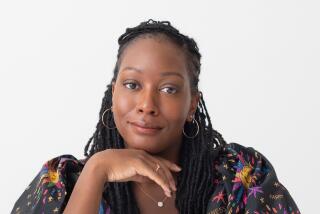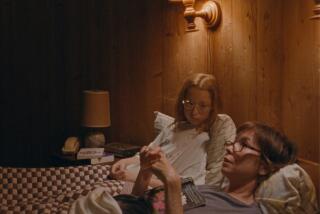Review: Noy Holland’s novel ‘Bird’ slips between past and present, lover and life
“Bird” is a slim novel, beautifully constructed and emotionally potent, without a word out of place.
The book’s premise is simple but powerful: Bird, a married mother of two, spends a day at home caring for her family; as she attends to her tame, domestic duties, she remembers and relives the passionate calamity of her youth, in particular her turbulent relationship with her ex-lover Mickey.
“She blows a spider from her husband’s cheek, a tiny golden fleck ascending its silver thread... Hello, love, she thinks. Hello, Mickey.”
Not a lot happens, and that’s OK. Most of the drama exists in memories and in a smattering of phone calls with Bird’s friend Suzie, an unmarried, adventurous woman who represents a different path from the one Bird has chosen. “Those babies are everywhere at you, needing anything they find,” Suzie tells her as Bird drips milk down her shirt front. “Your every living tissue, sugar, is pressed into service — gone.”
But Bird’s story is not the one about the dissatisfied housewife, the resentful mother — instead it’s a meditation on memory and nested selves, of the way in which these multitudes are contained in a person’s body. (“Hadn’t he wanted more of her, all the old somebody-elses she had been, the torn-apart feeling she hoards?”)
The narrative slips easily between past and present in a way that feels organic and faithful to the experience of remembering. The result is both recognizable and wonderfully surreal.
Holland is a debut novelist, but she’s been publishing fiction for more than 20 years. Her first book of stories, “The Spectacle of the Body,” was published in 1994, and she’s since built up a formidable reputation as a short-story writer, with prestigious fellowships and a faculty position at University of Amherst.
In “Bird,” she’s written a book heavy with contemplation, and it would fall with a thud if it weren’t for Holland’s grasp on language. Her prose is poetic, lucid and haunting. Holland even writes sex in a way that feels genuinely erotic: “He had to offer his neck, the hinge was open, the predator’s handle of bone. Pretty, how he gave himself to it. His back softened, curved.”
Bird hasn’t seen Mickey in years, and yet his absence thickens the air around her, his past presence dominates her thoughts. “She would never in her life again see him. But she keeps cuttings of Mickey’s hair balled up in a drawer somewhere. She keeps the peel of the first orange they shared and a cruddy bloody tissue.”
The remembered relationship makes up the meat of this novel, and it is loaded with blood and gristle. Their life together blazes with sex, drugs and attendant misadventures — they squat in rundown buildings, they hitchhike across the country — but it’s too sad and awful to be glamorous. She and Mickey are plagued by disaster — a graphic miscarriage, a murdered dog. “This then this then this: days hooked together like pop-tops in a lacerating chain.” There’s an aching tone to these memories, but it’s something less rosy than nostalgia, the pain vivid and raw.
Mickey may be the one who got away, but there’s no question that Bird is better for his departure. He’s a fascinating character, seductive and compelling, but almost certainly abusive and dangerous. Even as she revisits the passions of her young, obsessive love, Bird doesn’t seem to regret its ending or chafe against her circumstances. She doesn’t despise her husband; she doesn’t resent her children. If anything, her scenes of motherhood offer the most tender moments in the book. This novel is not about regret, at least not in the usual sense. There are no specific mournings, no decisions bemoaned.
Bird doesn’t just ache for her past self — “She misses lives she has never lived — days issued out of the future, hours that will never be.” Suzie serves as her promiscuous alter ego, a direct window to another lived experience, but even that is only one of many. Ultimately, Bird inhabits her one body, and wherever her mind wanders, she can be only Bird, and only the Bird of today. She represents a cruel, central truth of the human condition: that we only have time and space to be who we are, but that longing is untethered and infinite.
::
Bird
A Novel
Noy Holland
Counterpoint: 176 pp., $24
Cha’s most recent novel is “Dead Soon Enough.”
More to Read
Sign up for our Book Club newsletter
Get the latest news, events and more from the Los Angeles Times Book Club, and help us get L.A. reading and talking.
You may occasionally receive promotional content from the Los Angeles Times.







